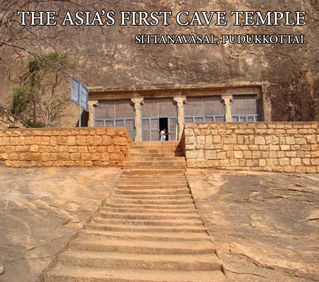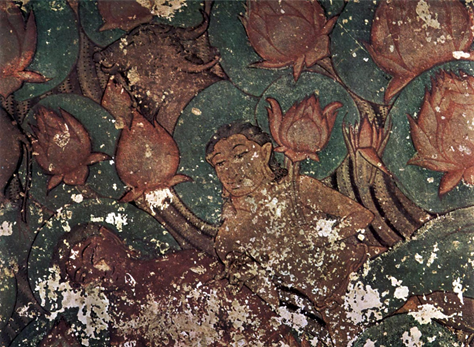

27th September 2022 (7 Topics)
Context
Archaeological Survey of India has undertaken conservation measures and also introduced digital checks to track public access in Sittanavasal, Pudukottai district of Tamil Nadu.
About
About Sittannavasal:
- Sittannavasal is a small village in Pudukkottai district and is world famous for its fresco paintings in the rock-cut Jaina cave temple.
- The megalithic monuments such as stone-circles, urn burials and cists spread in the plains of this village testify that this area was inhabited by pre-historic man.
- Sittannavasal is known primarily for its mural paintings in the Jaina rock-cut cave temple called Arivar-koil.
- There is a natural cavern, called Ezhadippattam, with polished rock beds of Jaina ascetics. These rock beds contain Tamil inscriptions.
- Sittanavasal also houses megalithic burial sites and the Navachunai tarn (small mountain lake) with a submerged shrine.
- In the Tamil Brahmi inscription mentioned before, the name of this place is mentioned as ‘ChiRu-posil’.
- Megalithic burial sites in this village testify that the areas around the hillock having been inhabited by iron-age men.

The Monuments:
- The Arivar-koil: On the western side of the hill, in the northern side, is the celebrated Jaina rock-cut cave temple called, Arivar-koil (temple-of-the-Arhat-s).
- It has relics of paintings of 9th century AD.
- These paintings are second only in importance after Ajanta paintings and have an important place in the Indian art history.
- The Ezhadippattam: On the eastern side is the natural cavern called Ezhadippattam with polished rock beds where Jaina ascetics practiced severest penance, for more than a thousand years since 1st century BC.
- It contains a 1st century BC Brahmi inscription and innumerable other Tamil inscription.
- The Megalithic burial sites: There are megalithic monuments like urn-burials, stone circles and cists in plenty, near to the hillock.
- The Navach-chunai: To the north of the natural cavern, on the eastern slope of the rock is a small rock-cut temple submerged in a tarn, called Navach-chunai.
- It requires some amount of rock-climbing and trekking to reach there.
Presently, the Jaina cave temple, the natural cavern called Ezhadippattam, and the megalithic burial sites are protected monuments and are under Archaeological Survey of India (ASI).
The Sittannavasal Paintings
- This Jaina cave temple is world famous primarily for its mural paintings.
- The ceiling of the sanctum and ardha-mandapam of this cave temple contain beautiful paintings.
- These paintings are of the classical or Ajanta style with variations in the handling of the materials by the artists.
- They furnish a connected link between the Ajanta paintings (4th – 6th century AD) and the Chozha paintings of 11th century at Thanjavur.
- These paintings include, as its subject matter, the Jaina Samavasarana, and in it the khatika-bhumi including a lotus tank, flowers, animals, bhavyas and dancing Apsaras, a royal couple and hamsas.

More Articles

